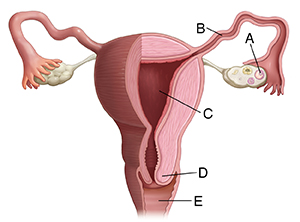Female Reproductive Anatomy
The reproductive system is the part of the body involved in sexual function. In women, this system also has the job of supporting a baby as it develops during pregnancy. The picture below shows the main parts of this system.
Who's who
A healthcare provider who specializes in caring for a woman’s reproductive system is called a gynecologist. An advanced practice nurse who specializes in caring for a woman's reproductive system can be either a women's health nurse practitioner, a certified nurse midwife, or a doctor of nursing practice.
Front view
This is how the female anatomy normally works:
A. Ovaries store eggs (female reproductive cells). About once a month, a woman's hormones trigger an egg to be released from an ovary. This is called ovulation.
B. Fallopian tubes carry eggs to the uterus. Pregnancy occurs if a man’s sperm fertilizes an egg as it moves through the tube.
C. The uterus is a hollow, muscular, pear-shaped organ. If an egg has been fertilized, it becomes an embryo and implants in the lining of the uterus where it grows into a baby.
D. The cervix is the narrow canal where the uterus and vagina meet.
E. The vagina is the pathway that connects the uterus with the outside of the body.

Hormones cause the lining of the uterus to thicken. This helps get the uterus ready to receive a fertilized egg. If pregnancy doesn’t occur, the thickened lining is no longer needed. It is then shed through the vagina. This is called having a period (menstrual bleeding).
Online Medical Reviewer:
Donna Freeborn PhD CNM FNP
Online Medical Reviewer:
Heather M Trevino BSN RNC
Online Medical Reviewer:
Irina Burd MD PhD
Date Last Reviewed:
12/1/2022
© 2000-2025 The StayWell Company, LLC. All rights reserved. This information is not intended as a substitute for professional medical care. Always follow your healthcare professional's instructions.